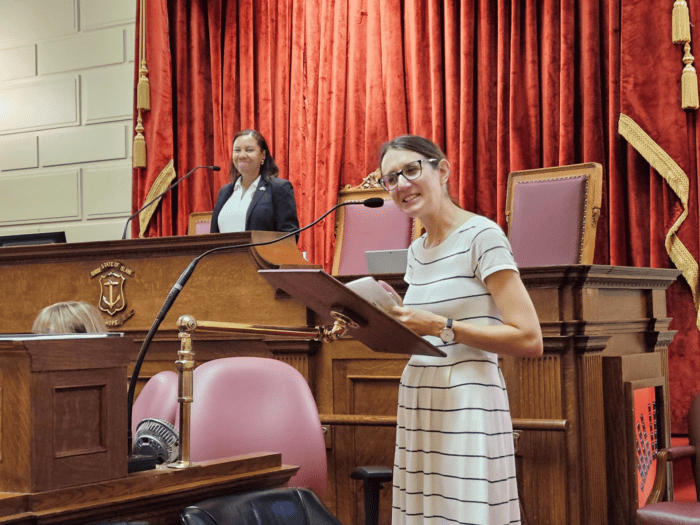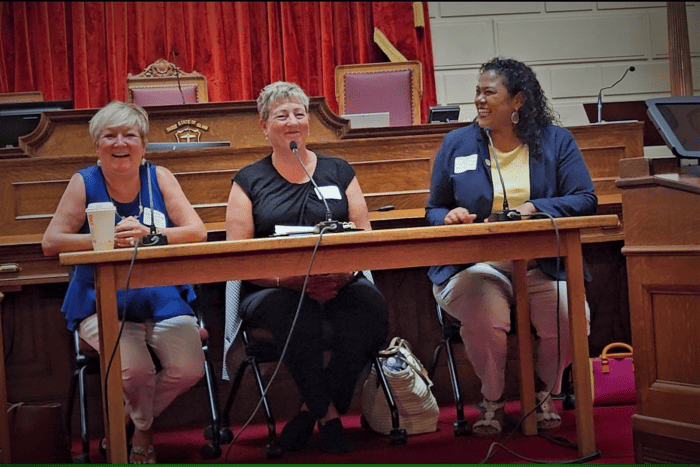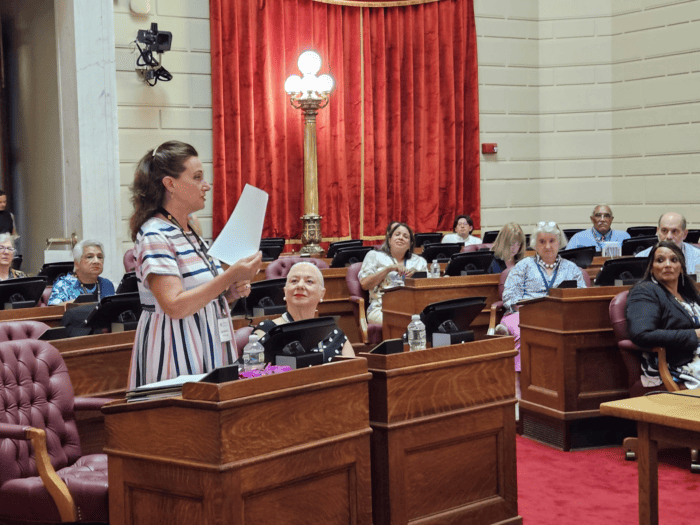Senior Fellows Learn to Lobby
Age-Friendly Rhode Island secured funding from Point32Health Foundation to underwrite the inaugural Senior Fellows Program with Leadership Rhode Island this summer. Twenty-five Rhode Island seniors met weekly in eight sessions to discuss challenges facing older adults, learn ways they can engage with elected officials and catalyze change.
On August 8 the program culminated with a final panel discussion at the Rhode Island State House entitled “Working with State and Local Government.” Panelists included Representative Julie Casimiro of North Kingstown, Newport City Councilor Angela McCalla who is Policy and Advocacy Program Director of the Women’s Fund of Rhode Island and former state senator Cindy Coyne who serves as executive director of the Senior Agenda Coalition.

Teresa DeFlitch of Leadership Rhode Island introduces Lt. Governor Sabino Matos
Lt. Governor Sabina Matos welcomed participants to the House Chamber and congratulated them for taking a step to become more engaged civically. “We need your voice, we need your experience in the state and we need your guidance so that we pass policies that are going to improve the lives of all Rhode Islanders” said Matos who is also the chair of the Long Term Care Coordinating Council which she invited participants to join as the council works on issues affecting the aging population.

Panelists Representative Julie Casimiro of North Kingstown, Newport City Councilor Angela McCalla and former state senator Cindy Coyne of Barrington
Panelists opened with words of advice and shared how the government process works. The most basic tip? Get to know your local and state representatives. If you have an idea, pick up the phone or use e-mail to reach out to them. Better yet attend a meeting or ask your local or state representative to meet you for coffee. Former senator Coyne noted that people can sit in the comfort of their own home and watch council meetings and senate hearings. She also suggested using rilegislature.gov/billtracker to follow topics of interest and be heard in committee hearings.
“The best way to get involved is to advocate for bills that are of interest to you and support candidates who are focused on making seniors a priority” said Representative Casimiro who went on to advise that one can’t expect to have a single meeting to convey their message. “It takes a long voice and a strong voice to get your message out” stated Casimiro who explained that there is a lot of advocacy needed and work behind the scenes needed to get a bill to the floor.
Councilor McCalla pointed out that the size of the state allows one to be noticed and one doesn’t need to have everything figured out in the beginning but should be able to connect with people and build a tribe. Over time she suggested advocates will need a strategy and a game plan so they should watch how legislatures are making decisions and the decisions that are being made.

Senior Fellow Gail Barbone Niemczyk asks the panelists about lobbying
When Teresa DeFlitch, Director of Leadership Development for Leadership Rhode Island opened the floor to questions, Senior Fellows zoomed in on lobbyists. Gail Barbone Niemczyk of Westerly asked how lobbying worked. Former Senator Coyne described a lobbyist job as paying attention to issues, knowing what direction bills are going in and being familiar the mission of groups for and against a particular bill. “They are the heartbeat or center of what is going on with a particular issue” said Coyne who added that sometimes lobbyists brought compromise around an issue as legislatures want to pass bills that most people are going to agree with.
Rep. Casimiro furthered that there is definitely an opportunity to change minds citing a vote on driver privilege cards during which she altered her vote after hearing from people who rationalized how the bill would protect insured drivers. When she stressed compromise was the key Rebecca Carter Allen of Newport offered that her civic commitment was centered on group mediation. Ms. Coyne recommended that everyone needed to learn to collaborate and as a senator she made a point of talking to lobbyists on either side of an issue. “Knowledge is power so one must understand both sides of an issue” said Coyne while Casimiro emphasized “everyone needs to talk to one another.”

Senior Fellow Ignacio Quiles asking panelists for more information
Ignacio Quiles of Providence asked the panel how one finds a lists of lobbyists while Virginia Lee also from Providence wanted to know how one might become a lobbyist. The answer to both questions was the Secretary of State’s Office. Councilor McCalla was quick to add that everyone in the room could become a lobbyist and shared how one person in her community dissected a bill that Rhode Island Energy was lobbying to pass regarding a vegetation plan which would authorize the company to go onto private property and install lines without securing permission. “The community member came up to the State House and testified and that bill was withdrawn” said McCalla who underscored how the power of presenting how an issue affects you and your community can cause elected officials to take pause.
Ms. Coyne wrapped up the discussion by likening advocacy to the fable The Tortoise and the Hare. She told the group there are many advocates who view themselves as the hare and want to get things done as fast as they can but more often the tortoise wins the race as one must put the hours in and chip away at issues. “People get very discouraged when a bill doesn’t pass but there are many reasons for it” said the former senator who added sometimes it makes the bill better to wait and get the resources needed to put it in place properly.
